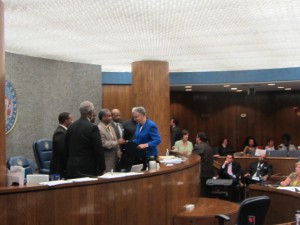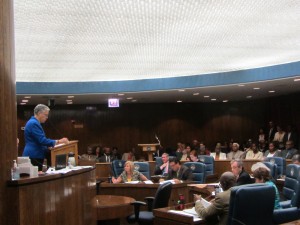Violence-prevention grants not going to hardest-hit areas
Kevin Beese — July 5, 2015
Cook County Board President Toni Preckwinkle greets ministers from local African Methodist Episcopal churches after a board resolution July 1 honoring the nine victims killed in a shooting at Emanuel AME Church in Charleston, S.C. Later in the board meeting, Cook County violence-prevention grant disbursements raised concerns among some county commissioners. Photo by Kevin Beese/for Chronicle Media
Cook County violence-prevention funds bypassing Chicago neighborhoods with the most violent crime and well-established prevention programs has rankled some county officials.
Cook County Commissioner Richard Boykin said it is inconceivable to him that an organization in Brighton Park, which ranks 38th out of Chicago’s 77 neighborhoods for violent crimes, got a $200,000 violence-prevention grant from the county’s Justice Advisory Council while no money went to the Austin area, the city neighborhood with the most violent crime.
“I support grants to turn the tide of violence,” Boykin said. “However, when I look at these grants they don’t reflect where the violence is really taking place in our community.
“… I represent Austin. Austin leads all the 77 neighborhoods in terms of homicides, ranks 11th in terms of violent crime, a population of 98,000, an unemployment rate of 21 percent and households below the poverty line of 27 percent.”
He said the East and West Garfield Park and North Lawndale neighborhoods are also troubled areas, but are not getting funding.
The Justice Advisory Council awarded $200,000 grants to the Brighton Park Neighborhood Council, Enlace Chicago, Youth Advocate Programs and Illinois African American Coalition for Prevention. Those grants were approved at the July 1 County Board meeting.
Commissioner Deborah Sims, who said funding should go to well-known violence-prevention agencies like CeaseFire in Roseland, voted against approval of the grants.
Commissioner John Fritchey, who wrote the legislation establishing the Justice Advisory Council and served on the panel’s first evaluation committee, voted “present,” feeling the program is not following its intended mission.
Boykin said he cannot accept funds not going where they are needed most.

Members of the Cook County Board discuss issues Wednesday. Some commissioners expressed concerns about county violence-prevention grants not going to Chicago neighborhoods hardest hit by violence. Photo by Kevin Beese/for Chronicle Media
“I don’t have a problem with folks getting money because, you know, $800,000 in terms of violence prevention, that’s a lot of money. But when it doesn’t go to the communities that are suffering from the violence, I do have a problem.”
Boykin said choosing the grant recipients the panel did sends the wrong message to residents of Austin, East and West Garfield Park and North Lawndale.
“I’ll tell you what the folks in those communities are going to say. They’re going to say ‘The folks who are in government, they don’t get it They don’t understand.’ And that’s their level of frustration and that’s why they’re frustrated in their communities because they’re going to say, ‘The money isn’t going to folks in communities that it ought to be going to.’”
Boykin said he will be pushing hard to change the criteria used to evaluate applicants so that communities more affected by violence “are moved to the front of the line” for such grants.
Boykin noted there were a few applicants from the West Side of Chicago and wondered why those organizations were not selected for a grant.
Lanetta Haynes Turner, executive director of the Justice Advisory Council, said the grant applications all go through a full vetting process with the evaluation committee. She said only three funding proposal were received from the Austin area and that they were vetted and evaluated against the other 21 proposals received.
“There are a lot of different factors that go into why an organization would get a grant or not. There are minimum standards they have to meet,” Turner said. “There is a very detailed evaluation criteria that is followed.
“For our violence-prevention grants, violence is definitely one of the key factors, but we can’t even get to that discussion in terms of geographic area until we know that they have scored the minimum scores to be qualified to receive a grant.”
Commissioner Stanley Moore, who served on this year’s evaluation panel, said it was a “very, very, very difficult process” to choose the grant recipients.
Turner noted that there is $1.1 million in grants still to be distributed by the county panel.
Commissioner Sims, who sat on the first grant selection panel with Fritchey, said it is confusing that a group like CeaseFire, which has worked in the Roseland neighborhood for years, did not get a grant.
“I can’t understand how an organization like CeaseFire – the one organization that was doing the work, the one organization that still exists” wasn’t funded, Sims said. “… Everybody in Roseland knows CeaseFire.”
She said CeaseFire and Victory Apostolic are violence-prevention organizations well known in the South Suburbs and the city.
“The organizations you picked, I’ve never heard of them,” Sims said. “And I’m quite sure if you go to my community and you ask them about CeaseFire or you ask them about Apostolic, they can tell you about those organizations.”
She said organizations coming from outside a community for violence prevention does not work.
“You can’t cross lines. There are these invisible lines that exist in communities and people won’t work with people coming from outside the organization,” Sims said.
Fritchey said “it is easy to play Monday morning quarterback” about the grant recipients, but added that he feels the program is not addressing what it should.
“I do feel that this program has somewhat lost its way,” he said, noting that Youth Advocate Programs, an organization based in Pennsylvania, received one of the grants.
Turner said even though that organization may be based in Pennsylvania it has longstanding offices in Chicago and hires youth advocates from the community.
Fritchey said that maybe the county needs to take a step back and re-evaluate what it is trying to accomplish with the violence-prevention grant program.



